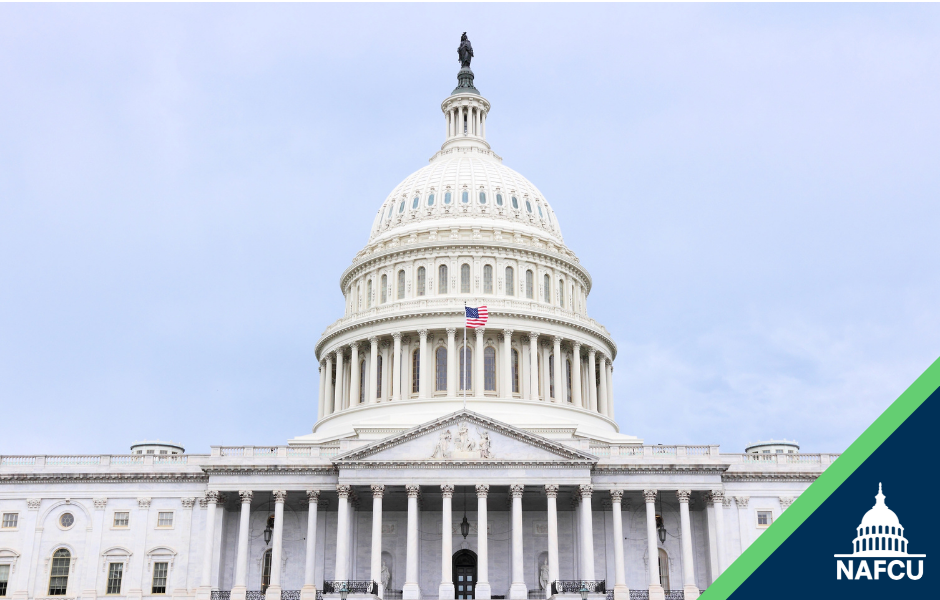Newsroom
This week: NAFCU defends CUs against interchange push, gov’t shutdown
 The House and Senate are busy on Capitol Hill this week as lawmakers try to secure agreements on funding measures ahead of a potential government shutdown at the end of the month. Notably, Sen. Roger Marshall, R-Kansas, has threatened to hold up the process by calling for a vote – either as a standalone or amendment to one of the funding packages – on his proposed big box bailout legislation.
The House and Senate are busy on Capitol Hill this week as lawmakers try to secure agreements on funding measures ahead of a potential government shutdown at the end of the month. Notably, Sen. Roger Marshall, R-Kansas, has threatened to hold up the process by calling for a vote – either as a standalone or amendment to one of the funding packages – on his proposed big box bailout legislation.
Marshall last week filed the Credit Card Competition Act (CCCA) – a bill sponsored by himself and Sen. Dick Durbin, D-Ill., that would extend debit interchange requirements to credit cards – as an amendment to the Military Construction, Veterans Affairs, and Related Agencies Appropriations Act. NAFCU President and CEO Dan Berger urged senators to reject Marshall’s efforts, highlighting the consequences it would have on consumers and credit unions.
In addition, NAFCU joined with several other financial services industry groups to oppose the latest interchange push.
“The financial services industry stands united in opposition to the effort by Senators Durbin and Marshall to delay funding for veterans and our military in order to gift a massive government handout to Walmart, Target, and other big-box retailers,” the groups said. “The Durbin-Marshall credit card routing legislation has no relevance to military or veteran spending whatsoever. We call on both Senators to promptly abandon their effort to use the Military Construction, Veterans Affairs, and Related Agencies Appropriations Act to secure government favors for big-box retailers at the expense of consumers, small businesses, and small financial institutions.”
NAFCU is also monitoring an amendment filed by Sen. Josh Hawley, R-Mo., to attach his Capping Credit Card Interest Rates Act – which would cap credit card annual percentage rates at 18 percent – as an amendment to the military appropriations bill. NAFCU and CUNA raised concerns about the bill, noting that it could “push people with marred credit histories and on the financial fringe to payday lenders, as well as discourage future innovation and new products.”
However, Marshall’s plot isn’t the only effort delaying movement on government funding. In the Senate, Sen. Ron Johnson, R-Wis., opposed unanimous consent on a “minibus” approach to create small funding packages. In the House, divisions among lawmakers created a shortfall of votes needed to overcome procedural hurdles that may lead to a Republican-version of a continuing resolution, which would face opposition in the Senate.
NAFCU will continue to monitor funding efforts and urge lawmakers to advance legislation to prevent a shutdown, provide stability in government programs, and adequately fund credit union priorities.
Also happening this week:
- tomorrow, NAFCU kicks off its CFO Summit in Las Vegas (view the agenda);
- tomorrow, the House Financial Services Subcommittee on Financial Institutions and Monetary Policy holds a hearing on economic consequences of regulatory overreach;
- tomorrow, the Federal Open Market Committee begins its two-day policy setting meeting;
- Wednesday, the Senate Banking Committee will discuss artificial intelligence in financial services;
- Wednesday, the House Financial Services Committee will markup several bills, including one to prevent the issuance of a central bank digital currency;
- Thursday, the NCUA Board meets and is set to finalize a financial innovation rule related to loan participation and eligible obligation regulations; and
- Friday, NAFCU is offering a webinar on credit card portfolio sales and agent programs.
Stay tuned to NAFCU Today for the latest out of Washington.
Share This
Related Resources
SAFE Act; Interchange; BSA
BSA Consumer Lending Home-Secured Lending
Blog Post
Get daily updates.
Subscribe to NAFCU today.
